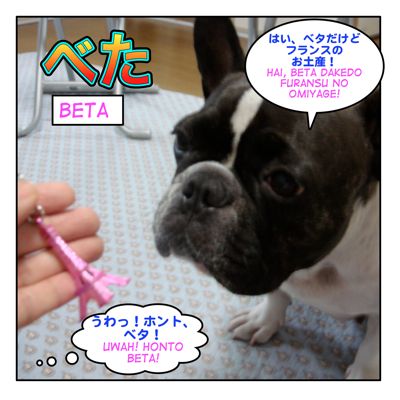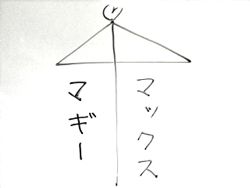「はい、ベタだけどフランスのお土産!」
= Hai, beta dakedo furansu no omiyage!
= I know it’s very cliché but here is a souvenir from France.
(うわっ!ホントベタ….)
= Uwah! Honto beta….
= Oh my…It IS really cliché….
Hi everyone!
ただいま〜〜!! ( = Tadaimaaaa!!) I am baaaack! !happyface!
Thank you for waiting for me and my lessons. I had a really nice vacation in France.
I mentioned once in my お土産= omiyage = souvenir, gifts lesson , it is important for Japanese to bring back gifts when they travel.
See, I brought you a tacky Eiffle tower key chain. Do you like it? :)
This kind of souvenir is considered to be べた ( = beta(= cliché, stereotypical which is nothing new and you can find it at many tourist spots.
So today’s slang is,
:u:
ベタ/べた=beta
![]() adjective : ベタな/べたな ( = betana)
adjective : ベタな/べたな ( = betana)
Note : You can write them either in katakana or hiragana
It means cliché, stereotypical, too typical, corny, old hat
It originally means “ありきたりな” ( = arikitarina ) ordinary, nothing special, very common
and refers to small newspaper articles which deal with small local news.
So ベタなお土産 ( = betana omiyage ) are the typical things for the area and everybody can guess where you got from.
Not just a thing but also when we hear a predictable cliché line = ベタなセリフ ( = beta na serifu)that we hear often in old TV dramas or movies,we say
:u:
「べた〜!!」
= Betaa!!
= It is so cliché.
![]() Note : 〜 is used when we stretch out the sound and it looks cuter or more comical than ー.
Note : 〜 is used when we stretch out the sound and it looks cuter or more comical than ー.
What kind of lines are considered to be ベタ ( = beta)?
Ex. 「君は僕の太陽だ!」
=Kimi wa boku no taiyou da!
=You are my sunshine!
Comedians especially in Kansai area, say
「ベタやな〜」(=betayanaa) to tease other comedian when they see ベタなギャグ ( = betana gyagu ) = cliché gag
![]() Note : やな〜 ( = yanaa) is Kansai dialect of だな〜 ( = danaa)
Note : やな〜 ( = yanaa) is Kansai dialect of だな〜 ( = danaa)
Also cliché drama situation are called ベタ ( = beta)
![]() ベタなテレビドラマ
ベタなテレビドラマ
= Beta na terebi dorama
= TV shows full of predictable behavior or lines.
For example, in
boucingheart! 恋愛ドラマ
= renai dorama
= romantic TV drama
A girl and boy are talking alone in the classroom. She likes him, but he doesn’t get how she feels. Finally she gets frustrated and jumps out of the classroom saying
「〜君のバカ!」
= ~ kun no baka!
= You stupid!
Or
a couple in love running around the beach or splashing water on each other. A boy or girl shouts to the ocean saying,
「(name) が好き!/好きだ!」
= (name) ga suki! / sukida!
= “I love you + name!”
(Note: 好き!= Suki! = female speech / 好きだ= sukida = male speech)
Beaches are often used for the location for ベタなドラマ=betana dorama
For example, a frustrated young guy is running around the beach and shouts towards the ocean.
「ばかやろ〜!!」
= Bakayaro~!!
= F**k!!!
Collecting small stones and lining them up and making a heart shape or picture of an umbrella (*相合い傘 = aiaigasa) with your name and your loved one’s name is very ベタ( = beta).
Note : 相合い傘 = aiaigasa = to share an umbrella
Also,
ベタなサスペンスドラマの最終回
= Beta na sasupensu dorama no saishuukai
= Typical ending of a suspenseful TV drama
is always on the top of the cliff = 断崖( = dangai)where they can see the ocean deep down.
I’ll keep going,
An old family who lives in a small room and a bedridden mother talks to her child coughing
「ごめんよ、母さんが体が弱いばかりにお前に苦労をかけて」
= Gomenyo, kaasan ga karada ga yowai bakari ni omae ni kurou wo kakete.
“I’m sorry. I made trouble for you by getting sick.”
If you want to know more about ベタ ( = beta) stories or lines, you can search them on the net. There are books of ベタ ( = beta) collections.
Also there used to be a very fun TV quiz show where panelist guess what is going to happen next as they watch fake ベタ ( = beta) dramas.
I couldn’t find the video but this is the commercial video.
These are all cultural so you may not get many of them but at least you understand why some Japanese people say
「ベタだなあ…」
=beta danaa..
= It is so cliché!
in certain situations.
 マギー先生より= Maggie Sensei yori = From Maggie-Sensei
マギー先生より= Maggie Sensei yori = From Maggie-Sensei
Nobody likes my ベタなお土産 = betana omiyage…= cliché souvenir !ryouwink!
Give me some good examples of ベタ ( = beta) lines that you know.
***
Will you be my Patron?
I appreciate your support! サポートありがとう!



12 Comments
いつもお世話になってます。
この間の質問者のtakkyでございます。私の事はまだ覚えてるかどうか、わかりませんけど。
また、お世話になります。よろしくお願いします。
ある「イヂオム?」が発見しましたんですが。まぁ、あるバンドからの歌詞なんだけど…これです。
「後がない」ってどういう意味ですか。
「もう、これしかない!」が
「もう、こんの・こんな方法しかない!」が
「前を進むしかない」って色々考えって、こんな感じですかね。
マギー先生にはもうちょっと詳しく説明もらえると、すごく助かります。
ちょっと変わった質問とおかしい日本語を通じしましたか、すごく心配です。
よろしくお願いします。
PS、こんな質問、ここに書けばよろしいのでしょうか。もし、NGだったら、申し訳ございません。今度、気をつけます。
@takky
お久しぶりです!!「もう後がない」は、It is now or never.と言う様な、今、このチャンスを逃したら次のチャンスがない、今やらないと一生できないという時に使います。
また、いろいろな方法を試してみて最後に残された方法はこれしかないという時にも使います。at the end of the rope.
Ex. 受験で失敗し続けてもう後がない。
質問はどのコメント欄(らん)に書いてもらってもいいし、もしTwitterをやっていたらいつでもTwitterで質問して下さい。
(Maggie Sensei)
Nice examples. Hadn’t even come across that word yet.
The video was pretty tough for me, had to read the transcript and translation a few times to understand how it adds up to that meaning.
Thanks.
@shirankao69
Don’t worry about the video. It is tough.
Wish I could show you the real TV show. You will hear the word “beta” a lot in the show.
Maggie sensei, I missed you! :D
Thanks for the new lesson! I really look forward to visiting your blog and learning new things. ^^
@Amelie
Hi Amelie! ひさしぶり!Thank you for always visiting our site! これからももっとおもしろいレッスンをがんばって作りますね!
maagie先生!!!
I love ur lesson…
また宜しくね^^
@vinda
Hi vinda!
Thank you for your comment! こちらこそヨロシク!! !heart!
is it ok for girls to say 「ベタだなあ…」 or is it a bit rough? I know the girl in the video said it, but she could be a rough girl…
Thank you for the lesson! .<
@Aki
Yes, girls can say「ベタだなあ…」and it doesn’t sound rough. (It all depends on how you deliver it.)
You can also say「ベタ〜だね〜!」「ベタ〜!」etc.
A great lesson!
Thank you for all the work you put in your page.
Its like having a Japanese friend to talk to everytime.
I´m studying Japanese for a long and your page makes it much easier to me to understand Japanese better. Thank you so much!!
@Fuchsmaul
ここに来てくれる人はみな、私の友達です!
Thank you for your nice comment! また来てね! :)